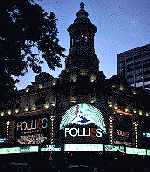LONDON THEATRE - DRAMA AT IT'S BEST
by Louis BignamiDuring salad days in New York City we would take a week's vacation, fly to London, stay in a B&B, eat pub grub and enjoy at least one theatre performance a day for a week. Low theatre prices, compared to those in the Big Apple, made the trip free if, of course, you didn't shop. But who can "not shop" in London?
On our last trip, we took the underground into Parson's Green and walked a couple of blocks to our favorite B&B. Sally, our hostess, was delighted to see us. "Well, you're late, but you made it. Going to rest from jet lag?" she asked. "Nope, we're off to the British Museum to see my favorite sculpture and then it's "pub grub" and Kiss Me Kate."
KMK, whatever its drawbacks, does keep you awake. Since we stayed 12 days we "only" managed 12 performances -- no theatre on Sunday, but you can double up on matinees. This may seem excessive, but London Theatre -- only folks from the "colonies" spell it "theater" -- seems one of the seven wonders of the modern world. 
Classic Musicals, even those without the success of blockbusters like CATS offer good value.
PHOTO CREDIT: ANNETTE LUCIDO
Thirty years ago London theater was the stodgy repository of Shakespeare and required a suit and tie or a "proper dress." Don't get us wrong, we like Shakespeare well enough to sit through both parts of Henry IV on one night, and I've seen the Bard's entire canon at least twice -- well, except for Titus Andronicus. Seeing that twice would be "cruel and unusual punishment."
But today's theatre, thanks to the rise of British musicals like Cats and the solid training of its traditional theatre schools and regional "bush leagues," offers a happy mix of classic to experimental drama, bawdy to beautiful revivals, a chorus of musicals and some eccentric items such as When Did You See Your . . . Trousers?
Most of all, London theatre is humane. Shows start at a reasonable hour. So everyone can make the last train home. You can see a matinee and an evening performance without risking shin splints on the dash from theatre to theatre. Seats are comfortable. Aisles are wide and theatre box offices, especially the half price Leicester Square Ticket Booth, are convenient to shopping and attractions like the National Gallery. Nobody shoves. Nobody, save a few French tourists and what sound like New Yorkers, jumps lines. Some nod, but few snore, and the now acceptable informal garb should not suggest less than full audience attention.
Days Out, Theatre Nights
You could argue that London built its transportation system around theatres -- it probably worked the other way round. None is more than a block or three from an underground station. Several, like the site of the wildly theatrical skater's production of Starlight Express, within a whistle of Victoria Station, are very close to one of London's many train stations. One wonders if productions reflect this with upscale themes towards Earls Court and blue collar themes to the south and west.
So, with proper planning you can pick your theatre performance with your "out and back" cost-cutting out-of-town excursion in mind. Even if you don't, you can take the Circle Line of the Underground and get from any station to any theatre with one transfer and 20 to 30 minutes travel time. Grab some pub grub like the killer apple pie with good British Cheddar in the pub across the street from long-running Les Miserables. Or sample one of the biggest baked potatoes ever and you'll be full for a pound or two.
Costs Considered
London's theatre humanity extends to pricing. London theatre isn't expensive unless you deal with the hotel ticket office or ticket brokers who snap up seats to the most popular productions. As in a great many theatre towns, Leicester Square Ticket Booth offers more expensive seats at half price and availability changes from day to day. So regulars line up and get the latest and greatest reports from those in the line. These, happily, can be rather more accurate than "professional reviews."
We've had good luck "nipping by" theatre ticket offices as we wander downtown. Sometimes it takes a time or two. Other times you need to try lines, but we've always been able to get tickets eventually. A mix of discount and box office tickets keeps prices down and, for most performances, any price is cheap if you divide Liason Dangereuses in the afternoon and Phantom of the Opera at Her Majesty's Theatre in the evening -- both with original cast! Peter O'Toole in The Apple Cart still rings true, and Richard Burton's Hamlet or "Sir Larry's" Richard never fade. .
London's theatrical "humanity" extends to its productions. Years back we saw Nunsense, a rather zippy musical headlined by Honor Blackman --she played "Pussy Galore" in the James Bond movie Goldfinger.
I don't remember her mother superior's outfit very well, but the skin-tight jumpsuit in the movie left an indelible impression! So did the player in the nun's outfit that jumped onto my lap. Since Nunsense had played for some time, demand had obviously slackened, but instead of the Draconian closures practiced on Broadway, management simply moved the show to a small theatre that didn't seat more than a couple of hundred people. The lead took a cut; everyone kept working. The show, not the star, seems the thing. 
Arguably the best of the British musicals -- Sorry Andrew Lloyd -- "MIZ" still goes strong.
PHOTO CREDIT: ANNETTE LUCIDO
Granted that the leads of productions like Cats, "Les Mis" or Miss Saigon travel well. Their performances remain the same in New York, Sydney or Tokyo even though the languages change. However, it's the depth of the London theatre that makes it so special. Clear articulation, good movement, wonderful voices and interesting stagecraft extend down to the spear carriers in the back of the chorus. There's simply been so much work for so long that the talent pool is deep enough to allow you to see a different performance each night. Frankly, theatre always seems best in its natal hall where it's perfected. These days, that's usually in London. So at the minimum, try a modern musical, a solid drama, Willie the Shake's quite acceptable. Ibsen works in a pinch and finish up with something like Agatha Christie's Mousetrap that's coming up on 50 years in the same theatre soon.
